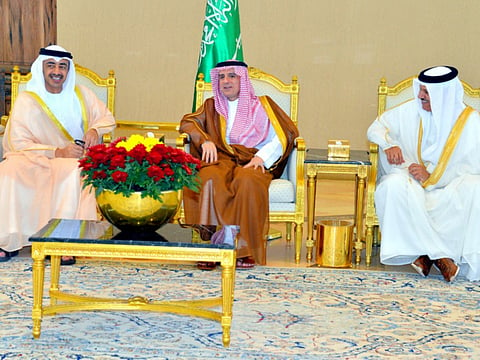GCC ministers reject Iranian interference
Ministers reiterate firm stand on region's issues, including the Palestinian cause

Riyadh: The fifth joint ministerial meeting of the foreign ministers of the GCC member states, Jordan and Morocco concluded in Riyadh today.
The ministers emphasised the importance of reaching a political solution in Yemen, based on the GCC initiatives, the outcome of the comprehensive national dialogue and Riyadh Conference, and the unconditional implementation of the Security Council's resolutions.
They also renewed their countries' commitment to continue the efforts to alleviate the plight of the Syrian people, calling on the international community to shoulder and share responsibilities of supporting refugees and ensuring their return as also of the displaced Syrians to their homes.
Shaikh Abdullah Bin Zayed Al Nahyan, Minister of Foreign Affairs and International Cooperation, headed the UAE delegation to the meeting.
The ministers issued a final communique in which they expressed satisfaction regarding the ongoing joint work and achieve a strategic partnership in accordance with the work plans adopted at the previous meetings of the foreign ministers of the GCC member states, Jordan and Morocco.
The communique said the joint ministerial meeting praised the continuous exchange of visits by the leaders of GCC countries, Jordan and Morocco, which reflected the importance that the leaders attached to developing outstanding relationships among their countries.
The ministers welcomed the signing of a memorandum of understanding for cultural cooperation between the GCC countries and Jordan.
"Regarding various regional and international issues and based on continuous consultation and coordination between the GCC countries, Jordan and Morocco, the ministers formed identical views on various regional and international issues of common interest," the communique said.
The ministers expressed their unwavering stances towards regional issues, particularly the Palestinian cause.
The ministers stressed the need to deal firmly with the dangerous phenomenon of terrorism and terrorist movements, praising the efforts of their countries in this regard at all international and regional levels.
They also praised Saudi Arabia's initiative to form an Islamic military alliance to fight terrorism and extremism, stressing the importance of this alliance to strengthen international efforts to combat terrorism.
The ministers reiterated the right of sovereignty of the UAE over its three islands of Greater Tunb, Lesser Tunb and Abu Musa, stressing that any practices or actions indulged in by Iran over the three islands are null and void.
The ministers reiterated their call for Iran to respond to the efforts exerted by the United Arab Emirates to resolve the issue through direct negotiations or at the International Court of Justice.
The ministers expressed their complete rejection of the Iranian interference in the internal affairs of the GCC countries and the region, stressing their strong condemnation of the attacks on the Saudi Embassy in Tehran and the Saudi Consulate in the Iranian city of Mash-had, holding the Iranian authorities fully responsibility for these terrorist acts.
The ministers reiterated their firm stand on the region's issues, including the Palestinian cause. They condemned Israel's continuous occupation of the Arab territories, the Israeli measures to alter the identity of Jerusalem, the continuous building of settlements, arbitrary arrests and collective punishment of Palestinians in the occupied territories.
They underlined the role played by Al-Quds (Jerusalem) Committee, chaired by His Majesty King Mohammad VI of Morocco, and its financial arm, Bayt Mal al-Qods, in protecting the city and the people of Jerusalem.
Hezbollah, Iraq and Libya
The minister also referred to the resolution issued by the 33th meeting of the Arab Interior Ministers' Council on 2nd March, 2016, considering Hezbollah a terrorist organisation.
The ministers also noted the efforts of Bahrain's security authorities in foiling a terrorist plot, backed by Iran's revolutionary guards and the terrorist organisation of Hezbollah, in January.
On Iraq, the minister stressed the need for a collective and comprehensive political process and expressed keenness and respect for Iraq's unity, sovereignty and regional safety.
The ministers welcomed the keen efforts made by Morocco in facilitating the signing of Skhirat Agreement between different Libyan parties. They renewed their full support to the legitimate government in Libya.
Earlier, the meeting opened with a speech by Saudi Foreign Minister Adel bin Ahmad Al Jubeir who said: "This meeting comes as a continuation of previous constructive meetings amid the prudent instructions of their majesty and highnesses, the leaders of our countries, to discuss ways of enhancing the historic ties binding our countries and peoples and the current mechanisms of cooperation among them."
He went on to say that "the continuation of these meetings confirms once more the will to enhance the firm ties among us and to proceed forward towards achieving a distinguished strategic partnership and benefit from our diversified abilities and invest them in achieving our interest according to agreed upon joint plans to promote cooperation in all fields."
Sign up for the Daily Briefing
Get the latest news and updates straight to your inbox

